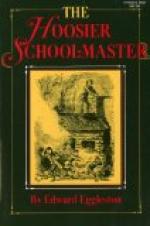[Footnote 10: In naming the several parts of the Indian corn and the dishes made from it, the English language was put to many shifts. Such words as tassel and silk were poetically applied to the blossoms; stalk, blade, and ear were borrowed from other sorts of corn, and the Indian tongues were forced to pay tribute to name the dishes borrowed from the savages. From them we have hominy, pone, supawn, and succotash. For other nouns words were borrowed from English provincial dialects. Shuck is one of these. On the northern belt, shucks are the outer covering of nuts; in the middle and southern regions the word is applied to what in New England is called the husks of the corn. Shuck, however, is much more widely used than husk in colloquial speech—the farmers in more than half of the United States are hardly acquainted with the word husk as applied to the envelope of the ear. Husk, in the Middle States, and in some parts of the South and West, means the bran of the cornmeal, as notably in Davy Crockett’s verse:
“She sifted the
meal, she gimme the hus’;
She baked the bread,
she gimme the crus’;
She b’iled the
meat, she gimme the bone;
She gimme a kick and
sent me home.”
In parts of Virginia, before the war, the word husk or hus’ meant the cob or spike of the corn. “I smack you over wid a cawn-hus’” is a threat I have often heard one negro boy make to another. Cob is provincial English for ear, and I have known “a cob of corn” used in Canada for an ear of Indian corn. While writing this note “a cob of Indian corn “—meaning an ear—appears in the report of an address by a distinguished man at a recent meeting of the Royal Geographical Society. A lady tells me that she met, in the book of an English traveller, the remarkable statement that “the Americans are very fond of the young grain called cob.” These Indian-corn words have reached an accepted meaning after a competition. To shell corn, among the earliest settlers of Virginia, meant to take it out of the envelope, which was presumably called the shell. The analogy is with the shelling of pulse.]
CHAPTER III.
MIRANDY, HANK, AND SHOCKY.
Mirandy had nothing but contempt for the new master until he developed the bulldog in his character. Mirandy fell in love with the bulldog. Like many other girls of her class, she was greatly enamored with the “subjection of women,” and she stood ready to fall in love with any man strong enough to be her master. Much has been said of the strong-minded woman. I offer this psychological remark as a contribution to the natural history of the weak-minded woman.




